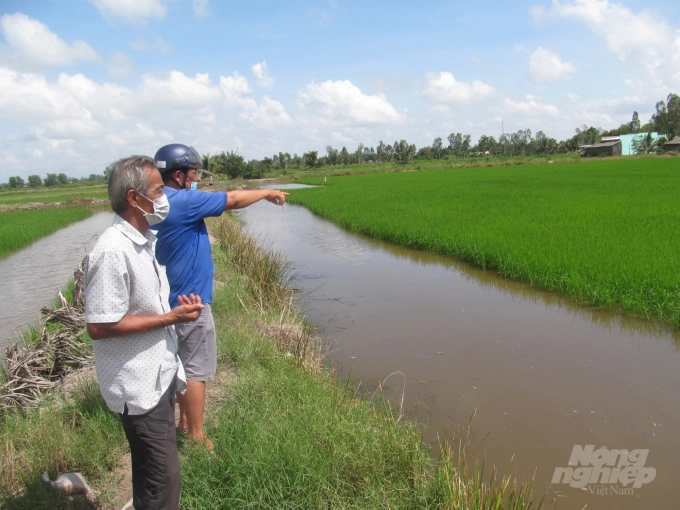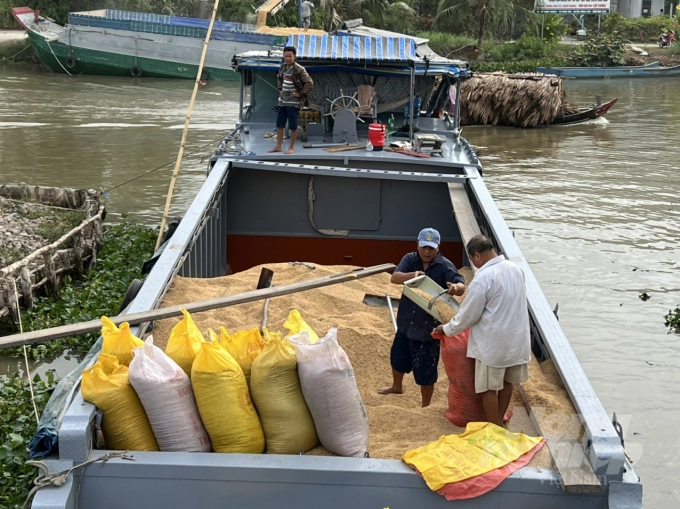May 17, 2025 | 02:43 GMT +7
May 17, 2025 | 02:43 GMT +7
Hotline: 0913.378.918
May 17, 2025 | 02:43 GMT +7
Hotline: 0913.378.918

Mr. Duong Van Thoi, Chairman of Hong Dan District People's Committee. Photo: Trong Linh.
Recently, The People's Committee of Hong Dan district (Bac Lieu) held the Reviewing Conference on the model of rice production in the shrimp area in the converted zone in 2021, implementing the plan to release shrimp for the first crop in 2022.
Mr. Duong Van Thoi, Chairman of Hong Dan District People's Committee (Bac Lieu) stated: While implementing the restructuring of the agricultural sector towards increasing added value and sustainable development, in the process of agricultural production, the district is divided into two distinct regions: The freshwater region specializes in 2 rice crops/year, focusing mainly on high-quality rice production with an area of over 9,000 ha and the converted production area under the shrimp - rice model with an area of over 24,000 ha and an average output of over 150,000 tons.
In 2021, Hong Dan district produced rice on a cultivated area of over 34,000 ha, a planting area of over 42,000 ha and an output of over 280,000 tons. The main rice varieties sown are Mot Bui Do, ST24, ST25, OM18, Dai Thom 8, hybrid rice and some new rice varieties.
In which, the fragrant rice group accounted for 35%, the seasonal rice (Mot Bui Do) accounted for 30%, the hybrid rice group accounted for 25% and other rice varieties accounted for 10%. The rice crop cultivated on shrimp land in 2021 has an average yield of 6 - 6.5 tons/ha, farmers gain a profit of VND20 - 30 million/ha minus the costs.

The shrimp-rice model has helped farmers in the transitional area of Hong Dan district to develop a fairly stable economy. Photo: Trong Linh.
In particular, for farmers in transitional areas, the shrimp-rice model is considered a smart and sustainable model, specially adapted to current climate change. This is a model with potential as well as an economic contribution model that accounts for a large proportion of agriculture.
Mr. Pham Van Quyen, a farmer in Ninh Chai hamlet, Ninh Quoi A commune, Hong Dan district (Bac Lieu) shared: “Since the conversion of production, the shrimp-rice model has become the main source of income for the family, as well as helping people to solve the challenges caused by climate change. Before farmers' income only depended on 2 rice crops/year, now they can earn additional income from shrimp."
Thanks to the shrimp - rice model, farmers in Ninh Quoi A commune are able to earn wealth, contributing to the change of this countryside. This is also a brilliant production model in the current conditions of having to cope with and adapt to the current drought and salinity,” said Mr. Quyen.
Mr. Phan Van Huong, a farmer in Ta Ky hamlet, Ninh Hoa commune, Hong Dan district supposed that: The biggest success of the shrimp-rice model is that farmers in the transitional area have actively applied new technical advances such as: Using salt-tolerant rice varieties, improving the season, using fertilizers, microbiological and biological pharmaceuticals in rice cultivation for shrimp-rice areas, especially expanding in the area from inefficient shrimp farming to the rotation of 2 shrimp crops - 1 rice crop. This is a way to achieve both high efficiencies and limit the use of chemicals, pesticides and chemical fertilizers in production.

Rice produced from the shrimp - rice models are always guaranteed offtake by businesses. Photo: Trong Linh.
It is safe to say that the shrimp-rice model has created an ecosystem, a safe and stable environment, beneficial for both shrimp farming and sustainable rice farming, producing safe products that meet the needs of consumers and export. In 2021, the total income of the model reached VND90 million/ha and delivered an average profit of VND40-60 million/ha/year.
Mr. Nguyen Quoc Thai, Chairman of Vinh Loc A Commune People's Committee (Hong Dan District) shared: Over the years, thanks to efficient production, the local shrimp-rice model has been continuously replicated. In 2019 the commune only had 1,600ha of production under the shrimp-rice model, in 2020 it increased to 2,100ha, by 2021 it reached 2,535ha.
Mr. Duong Van Thoi, Chairman of Hong Dan District People's Committee assessed: The biggest achievement of the shrimp-rice model is to change the mindset of farmers in the region, to switch from the old to the new, from the traditional way to smart agricultural production, adapting to climate change.
As Minister of MARD Le Minh Hoan once said, it helps farmers orient from agricultural production to an agricultural economy. The shrimp-rice model also helps farmers to produce clean agro-products, expanding the product consumption market…
The model of 2 shrimp crops and 1 rice crop is the main model for the economic development of Hong Dan district. This is considered a model of sustainable economic development in the context of climate change, the effects of drought, and saltwater intrusion. The model is considered to be "adaptable to the climate" and also an advantage for Hong Dan district to become the largest rice production and export center of Bac Lieu province in the 2021-2025 period.
Translated by Hoang Duy

(VAN) Cold-barn systems efficiently manage environmental and temperature conditions, which aids in the prevention of respiratory diseases in pigs and protects them from the vectors that transmit African swine fevers.

(VAN) To tackle challenges, the project 'Addressing key technical bottlenecks in the grouper supply chain in Vietnam' has been underway since 2024.

(VAN) The project 'Disease-Resilient and Sustainable Cassava Production Systems in the Mekong Region', funded by the Australian Center for International Agricultural Research (ACIAR), is being implemented from 2024 to 2028.

(VAN) Data from 10,000 farming households will help professionalize production organization and support the implementation of the One Million Hectares Program for High-Quality, Low-Emission Rice Cultivation.

(VAN) FAO Director-General QU Dongyu marks International Day of Plant Health at NENA conference.

(VAN) Deputy Minister of Agriculture and Environment Hoang Trung affirmed that floriculture and ornamental plants are a growing industry that receives significant global attention.

(VAN) The three staple crops dominating modern diets – corn, rice and wheat – are familiar to Americans. However, fourth place is held by a dark horse: cassava.